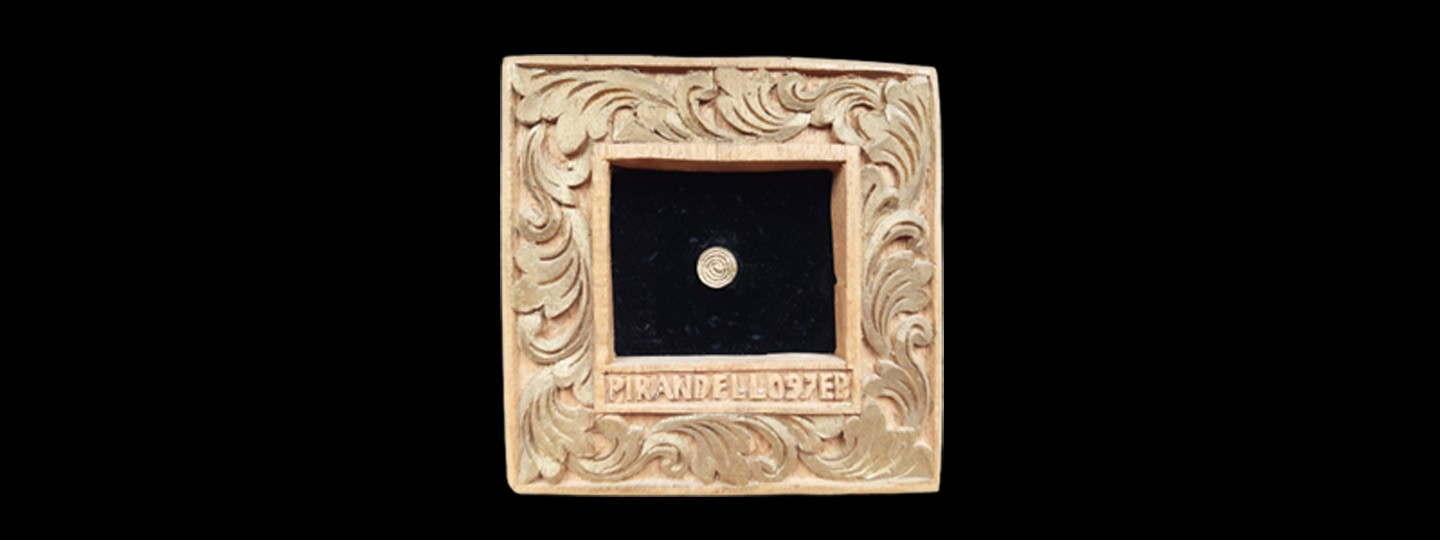Pirandello’s earrings

On 28 January 1997 , in Palermo, Eugenio Barba was awarded the “Luigi Pirandello” International Prize, dedicated to a personality who has marked the history of theater in our years. In previous editions the award has been given to Ingmar Bergman , Giorgio Strehler , Eduardo De Filippo , Luca Ronconi , Otomar Krejca , Harold Pinter , Jean-Louis Barrault , Andrezj Wajda , Tadeusz Kantor , Dario Fo .
The Pirandello Prize consists of a gold bas-relief depicting the playwright’s face, the work of the sculptor Emilio Greco . Motivating the attribution of the International Prize, the jury recalled the main stages of the artistic career of Eugenio Barba withOdin Teatret , his books, his scientific research withISTA , International School of Theater Anthropology, and concluded by noting that, more than any other theater man of our time, Barba has been able to create an environment in which actors and scholars interact to investigate the techniques and knowledge of the theater.
What follows is the speech with which Eugenio Barba thanked for the award.
I am here by chance, passing through.
I’ll stay there as long as I can.
Not that I’m bored, far from it! Indeed the journey
it amused me. But we must go.
Where will I go? I don’t know … Ouch, not even that!
But it doesn’t matter: I’ll go where it is.
What matters most is to decide early;
look around, and choose a way.
Easy to say, choose a way!
These are some lines from Pirandello’s poem La via. The exergue that Pirandello put before his verses is: “Try every way how our life is by chance” . Life has no other purpose than to maintain itself and reproduce. It is our job to make sense of it. The greatness of the human being resides in this ability to value randomness.
I do not think it is a coincidence that now I am here to receive this award, in a southern region, where I find the colors, smells, flavors and prejudices that make up my identity. Nor do I consider the choice made by the Commission a coincidence, which rewards not only me, but Else Marie Laukvik , Torgeir Wethal , Iben Nagel Rasmussen , Tage Larsen , Ulrik Skeel , Roberta Carreri , Julia Varley , actors and actresses who founded the Odin Teatret together with me, and who have been working there for 30, 20 years.
I imagine that the decision to give Odin Teatret this award required some courage from the jury. We are a group of men and women who have not given up on its strangeness and have achieved cultural diversity through theater in the suburban city of Holstebro. We represent the theater of the margin. It is to all the theaters of the margin that you gave your sign of recognition the moment you gave it to the Odin.
Margin theaters are not marginal theaters. They try to defend a margin, a void that allows itself to be filled by nostalgia and personal needs. They fight so that aesthetics, ideologies, techniques, poetics, fashions DO NOT invade him. They want an empty ritual, not usurped by doctrines.
The margin can be rough, but it can also be a reserve of air for those who feel suffocated; a reserve where threatened and difficult to share values can live; instincts of revolt; animals that no ark wanted to save: centaurs, basilisks, unicorns, dragons, mermaids. Or that other endangered animal in our hearts, God.
Margin theaters have a long tradition, famous names such as Stanislavskij , Mejerchol’d , Copeau , Brecht , Decroux , Beck and Malina , Grotowski and some others. At times, the sense of margin reverberates in dramatic texts; first of all the texts by Pirandello and Beckett , by Genet , by Cechov , by Ibsen and Strindberg , and perhaps also by the antipathetic Claudel . But these names are only the emerged part of the theatrical iceberg. The submerged part, its more consistent body, determines the presence and the way of navigating this island of the theater separated from the central and well-recognized regions. The submerged part is made up of a thousand and a thousand anonymous faces, in the thousand anonymous regions of our planet. It is they who constitute the profound tradition of the theaters that keep the margin alive.
This Pirandello with a golden face goes to the theaters of the margin and the anonymous and submerged theaters, and not only to Odin and me. I want to merge it. He, Luigi Pirandello , wanted to be cremated, to become ashes to mix with the land of Chaos , his village. He did not want to become a tomb. Now, sixty years later, I believe it is appropriate to merge this small and precious work of art that petrifies him. With this gold I will make many earrings. I want to give them to those in Australia, Africa, Asia, Europe and the Americas who defend the margin.
It is no coincidence: dozens and dozens of earrings, so that Pirandello whispers in new distant ears the suggestions for losing and finding one’s way, made up of actions and refusals.
Eugenio Barba

